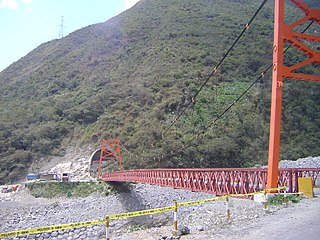
Chanchamayo or Chanchamayu is a province in northern Junín Region, in central Peru.
La Merced, Chanchamayo or Chanchamayu is the capital of the Chanchamayo Province in the Junín Region in Peru. Its mayor is Jose Eduardo Mariño (2019-2022).
Isla Incahuasi, Inkawasi or Inka Wasi is a hilly and rocky outcrop of land and former island in Bolivia situated in the middle of Salar de Uyuni, the world's largest salt flat, at an elevation of 3,656 meters. It is located in the Potosí Department, Daniel Campos Province, Tahua Municipality, Yonza Canton. Isla Incahuasi is the Spanish name where isla means island, Inca stands for Inca, and huasi is derived from the Quechua word wasi meaning house.
Inka Wasi is a Bolivian river in the Chuquisaca Department, Nor Cinti Province. It is a left tributary of the Pilaya River, an important right affluent of the Pillku Mayu.

The Chanchamayo River is a river in the Junín Region in Peru. It originates in the Huaytapallana mountain range where it is named Tulumayu. Chanchamayo flows along the town La Merced which is also called Chanchamayo. After joining Paucartambo River it is called Perené River.
Challwamayu is a river in Peru located in the Huancavelica Region, Huaytará Province, Pilpichaca District. It is an affluent of the Pampas River, the one which flows along the border of the Ayacucho and Huancavelica Regions. The confluence of the rivers is on the border of these regions, near Pukarumi (Pucarume). Challwamayu originates near the mountain Artisayuq (Artisayoc).

Challwa Mayu is a Bolivian village in the south-east of the Cochabamba Department located in the Arani Province, Vacas Municipality, north-west of Vacas. At the time of census 2001 it had 770 inhabitants.
Challwa Mayu may refer to:
Legiamayo or Lejiamayu is a river in Peru located in the Ancash Region, Carhuaz Province, Marcará District. It originates in the Cordillera Blanca west of mount Copa, near Lake Lejiacocha. It is a tributary of Marcará River, which in turn is tributary of Santa River.
Taqrachullu, Pukara Taqrachullu, T'akrachullu, Pukara T'akrachullu or María Fortaleza is an archaeological site in Peru. It is located in the Cusco Region, Espinar Province, Suykutambo District.
Khichuqaqa is an archaeological site in Peru with rock paintings and tombs nearby. It is situated in the Cusco Region, Urubamba Province, Urubamba District. The site lies at a height of about 3,160 metres (10,367 ft) on the slope of the mountain Kapuliyuq.

Qañawimayu which upstream is called Cayacti and downstream successively is named Jaraucata, Qullpa(Collpa), Yawina(Yavina) and Santo Tomás River is a river in Peru. It is located in the Apurímac Region, Cotabambas Province, and in the Cusco Region, Chumbivilcas Province and Paruro Province. It belongs to the Apurímac watershed.
Chillcamayu which upstream is called Jampamayo and downstream Pitumarca is a river in Peru located in the Cusco Region, Canchis Province, in the districts Checacupe and Pitumarca. Its waters flow to the Vilcanota River.

Hatun Mayu which upstream is called Qinamari(Quenamari) and downstream successively is named Nuñoa and Río Grande is a river in Peru. It is a right tributary of the Crucero River whose waters flow to Lake Titicaca. It is located in the Puno Region, Azángaro Province, Asillo District, and in the Melgar Province, in the districts Nuñoa and Orurillo.

Waqra Willka is a 5,066-metre-high (16,621 ft) mountain in the Andes of Peru. It is located in the Junín Region, Huancayo Province, Chongos Alto District. Waqra Willka lies east of Wira Challwa. A couple of small lakes named Yuraqqucha, Anqasqucha, Challwaqucha and Antaqucha are situated at the feet of the mountain.

Matagaga is a mountain on the eastern extensions of the Cordillera Blanca in the Andes of Peru, about 4,400 metres (14,436 ft) high. It is situated in the Ancash Region, Huari Province, Chavin de Huantar District. Mata Qaqa lies east of the Rangracancha valley and northeast of the Challhua valley. The Mosna River flows along its northern slopes.

Minapata is a mountain in the southern part of the Cordillera Blanca in the Andes of Peru, about 5,400 m (17,700 ft) high. It is located in the Ancash Region, Bolognesi Province, Aquia District, and in the Recuay Province, Catac District. Minapata lies south of Challwa and northeast of Qiwllarahu.
Usnu Muqu is an archaeological site in Peru. It is located in the Apurímac Region, Abancay Province, Tamburco District, near the main square of Tamburco.
Challwaqucha is a lake in Peru located in the Lima Region, Yauyos Province, on the border of the districts of Colonia and Tupe. It lies southeast of the mountain and the lake named Wankarqucha. The Challwamayu originates south of the lake. Its waters flow to the Cañete River.

Mulli Urqu is a 2,906-metre-high (9,534 ft) mountain in the Bolivian Andes. It is located in the Chuquisaca Department, Oropeza Province, Yotala Municipality. Mulli Urqu lies west of the Kachi Mayu which is a left tributary of the Pillku Mayu.









